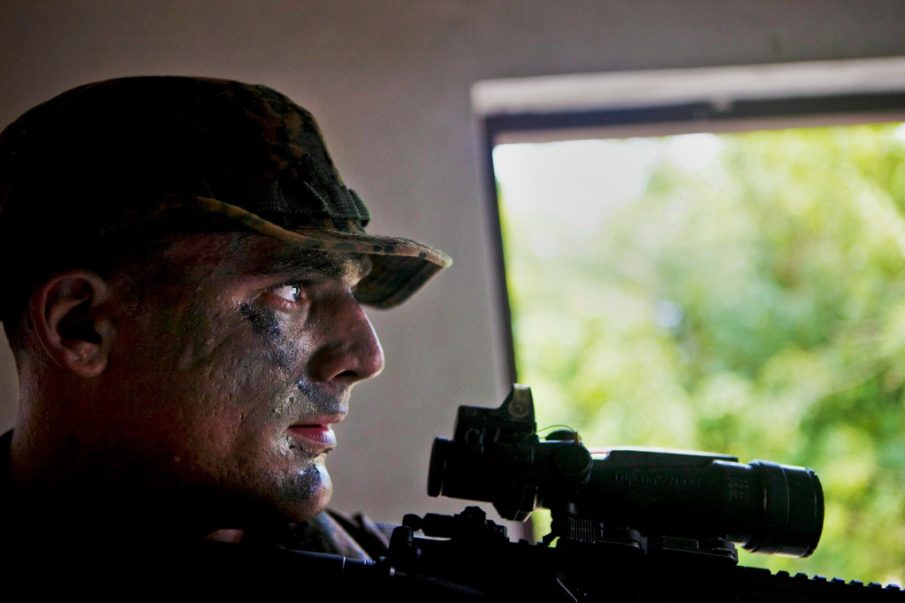You know the trope: the veteran comes home from “the war.” He is distant, has vivid flashbacks that send him careening to the floor, is always on high alert and can’t seem to turn it off; he digs foxholes in his backyard and drinks way too much.
Countless movies and television shows have portrayed veterans in this light: the broken veteran returning from war. It doesn’t matter what their job was or what war they fought in — they come home and they’re all the same “hollow shells” of what they used to be. Actors really have to practice their thousand yard stare for this one.
It’s certainly not exclusive to Hollywood. In my experience, several college students expected this from me when it came up that I was in the military and I was deployed. It wasn’t something I particularly brought up often, but I didn’t hide it in shame either. Those college kids got a pass in my book, as I don’t expect them to know one way or the other in regards to such things. Still, the idea is out there.
This has even extended to healthcare professionals — one such professional assumed my friend had PTSD simply because he was Airborne and because he was deployed. The fact that he was a Ranger and that the word “Airborne” was what stuck out in her mind already meant she had a fundamental misunderstanding of how these things work, let alone the fact that you could be in an airborne unit, or even a Ranger, deploy, and never seen combat. It’s happened plenty of times. It’s an automatic assumption that: “you went to war, you’re totally f***ed up.”
Why is this mentality dangerous?
Because war is not some simple, hazy disease that you just catch when you’re overseas. I’ve known guys (who didn’t see combat) come out of the military and are constantly told they have problems and probably will suffer from severe PTSD because they were deployed. ETSing and transitioning into civilian life has a whole slew of problems of its own, combat or not, and telling them they have these other problems can cause added confusion — especially when they start to believe you.
Victims of severe combat trauma need to admit that they are having problems when those problems arise. But it isn’t some blanket case where every military veteran is going to come out with a thousand yard stare and flashbacks that make them unable to function in today’s world.
“PTSD” is not a catch-all word for “problems arising from being in the military.”
As can be seen in our own society, constantly endowing the “victim” mentality on people or a group of people can eventually have serious effects. It can promote a culture where being a victim is part of your identity, not a hurdle or obstacle to overcome. Embracing it as a part of your identity, the way you might embrace your heritage, achievements or personality quirks, essentially means you’re saying, “This is a part of me, and to feel okay again means to lose a part of myself.” I don’t think any of us want that for our veterans that struggle with combat memories.
The truth is always complex. Maybe you are having legitimate issues with combat experiences. Maybe you’re having problems with the fact that you went overseas and never contributed the way that those guys who got their limbs blown off did. Maybe you’re having trouble with the transition from military life to civilian life, combat or not. Maybe you’re struggling with all of a sudden going from having an ultimate purpose or goal to the seemingly meaningless civilian world (it’s not meaningless, I assure you). Most likely, it’s some complex brand and mixture of the above, unique to your own life.
I always appreciate people who are honest with themselves. With the guy who has seen a lot of combat, struggles with it, and acts accordingly, seeking help. With the guy who has seen a lot of combat but doesn’t struggle with it. With the guy who didn’t see combat, but doesn’t have a chip on his shoulder about it and still strives to be the best that he can be.
Already have an account? Sign In
Two ways to continue to read this article.
Subscribe
$1.99
every 4 weeks
- Unlimited access to all articles
- Support independent journalism
- Ad-free reading experience
Subscribe Now
Recurring Monthly. Cancel Anytime.
It’s interesting, I think, on some subconscious level, others can always tell when one of the above is being dishonest with himself and others, whether intentionally or not. Francis Bacon said that, “It is a sad fate for a man to die too well known to everybody else, and still unknown to himself.” Many warrior philosophers throughout the ages would agree that self-knowledge is essential to the warrior lifestyle.
Don’t worry about all the labels and expectations of the world around you. The journey to any kind of self-healing begins with honest self-knowledge. Just like on the battlefield, fighting for peace or happiness starts with knowing the lay of the land — and, in this case, that is your mind.
Featured image courtesy of DOD.










COMMENTS